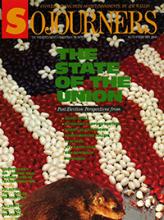IN HIS ACCEPTANCE SPEECH AT THE REPUBLICAN Convention in August, George Bush promised to work for a "kinder, gentler America." He then presided over arguably the cheapest, dirtiest political campaign in a hundred years. (The 1888 presidential campaign could vie with his for top honors.) For three months I saw George Bush's version of a kinder, gentler America, and (to employ theological terminology) it scared the hell I out of me.
We are now supposed to be in the "healing period," when the wounds and scars of the campaign are put behind us. I do not think we should do that too quickly, for although George Bush won the election, he lost respect, and that is the part of his campaign legacy that may be the hardest to overcome.
His campaign vision was a tarnished one. It was built on people's fears (the morally and racially flawed Willie Horton ads), on cheap shots (the scathing attacks on the American Civil Liberties Union), on obfuscation of the real issues (the adolescent flap about saluting the flag), and on the consistent trashing of a noble part of our heritage (the tradition of "liberalism").
It is a measure of the success of his tactics that the reason most frequently offered for Dukakis' defeat is that he waited too long to respond to the sleaze. Score one for Dukakis: Although he lost the election, he retained respect.
A second campaign casualty was Bush's selection of a running mate. Before announcing his choice, he told us that his selection (which he had many months to ponder) would "tell all" about his candidacy. It told many of us more than we wanted to know.
Read the Full Article

